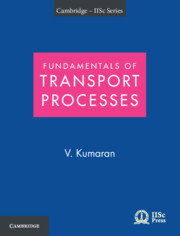Book contents
Summary
The two transport mechanism considered in this text are convection and diffusion. Convection is transport due to the flow. It is directional, and takes place only along the flow streamlines. Transport across streamlines, and transport across surfaces (where there is no fluid velocity perpendicular to the surface) necessarily takes place due to diffusion.
Diffusion is the process by which material is transported by the random thermal motion of the molecules within the fluid, even in the absence of fluid flow. The random velocity fluctuations of the molecules are isotropic, and they have no preferred direction. The characteristic velocity and length for the thermal motion are the molecular velocity and the microscopic length scale, which is the molecular size in a liquid or the mean free path (distance between intermolecular collisions) in a gas. While random molecular motion is always present in fluids, when the concentration/temperature/velocity fields are uniform, there is no net transport due to the random motion. Diffusion takes place only when there is a spatial variation, and transport is along direction of variation.
The molecular mechanisms of mass, momentum and thermal diffusion, are discussed in this chapter. Constitutive relations for the fluxes are derived from a molecular description, and the diffusion coefficients are estimated.
The gas diffusivities are estimated using kinetic theory for an ideal gas made of hard spheres, which undergo instantaneous collisions when the surfaces are in contact, but which do not exert any intermolecular force when not in contact. Real gas molecules do not interact like hard spheres—the interaction force between molecules is repulsive at small separations and attractive at larger separations. Diatomic and polyatomic molecules are also not spherically symmetric, and their interaction depends on the relative orientation of the molecules. The diffusion coefficients in the hard sphere model are proportional to √T, where T is the absolute temperature. For molecules with continuous intermolecular potential, the diffusion coefficients are proportional to a power of the temperature which higher than ½. The pressure-density relationship for real gases is also more complicated than that for an ideal gas, and the virial corrections need to be included for dense gases.
- Type
- Chapter
- Information
- Fundamentals of Transport Processes with Applications , pp. 105 - 136Publisher: Cambridge University PressPrint publication year: 2023



